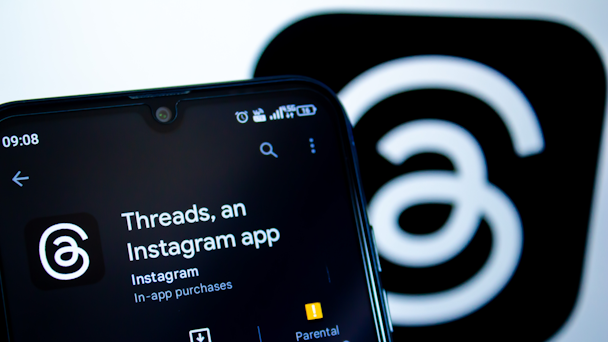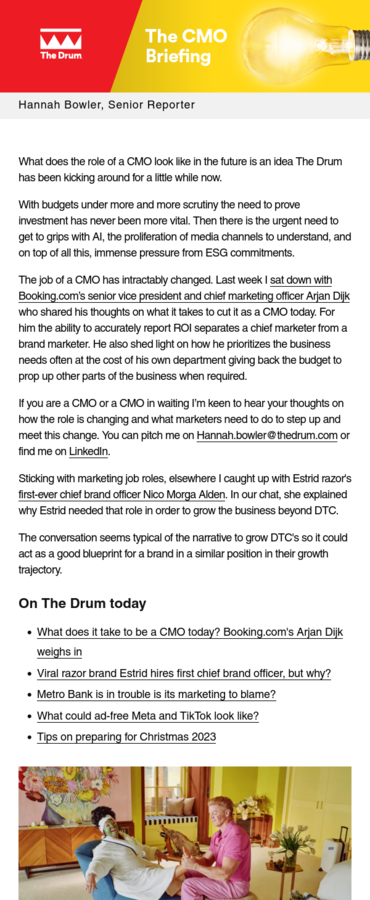AI bolsters Meta’s Q3 revenue surge, as Zuckerberg continues to bet big on the metaverse
The tech company was struggling amid layoffs, disgruntled investors and low sales in late 2022. Now it seems that its ‘year of efficiency’ strategy is paying off.

Launched in July, Threads quickly became one of the fastest-growing apps in history. / Adobe Stock
Tech giant Meta – owner of Facebook, Instagram, Messenger and WhatsApp – released its latest earnings report on Wednesday, revealing that the company earned around $34.15b in the third quarter of 2023 – a 23% increase compared with the same time period last year.
Following a rocky end to 2022, which included the laying off of roughly 13% of the company’s workforce, Meta CEO Mark Zuckerberg vowed that 2023 would be the company’s “year of efficiency.”
Zuckerberg clearly believes that Meta’s latest earnings report provides ample evidence that his vow is starting to come to fruition: “This was a good quarter,” he said on a call with investors Wednesday. “I'm pleased with our progress on efficiency this year. We're a leaner organization, shipping faster and advancing the state-of-the-art in all of our long-term initiatives.”
Advertisement
He emphasized Meta’s growing capabilities in AI, a technology that has taken the tech industry and much of popular culture by storm over the past year. “AI advances are driving a lot of our product and business performance,” he noted on the call.
It has indeed been a big year for Meta’s AI capabilities. The company unveiled the latest iteration of its Ray-Ban smart glasses – which come with built-in Meta AI features – at its annual Connect conference last month; the glasses hit shelves on October 17. Zuckerberg also noted in the call with investors that “AI-driven feed recommendations” are driving engagement with both Facebook and Instagram (a 7% and 6% increase, respectively), and that “more than half of our advertisers” are using the company’s Advantage+ Creative suite of AI tools to hone images and copy in ads across Facebook, Instagram and Messenger. And earlier this year, the company announced that it had open-sourced its Llama 2 large language model.
Reels, Instagram’s short-form video feature, which launched in 2020 to compete with TikTok, has also been driving growth at Meta. “Reels has now driven more than 40% increase in time spent on Instagram since launch,” Zuckerberg said on Wednesday. “In many ways, Reels has now graduated from being an early initiative to now being a core part of our app.”
Advertisement
Following a financially lean 2022, businesses are once again starting to invest more in digital ads, further strengthening Meta’s bottom line – as well as that of other tech giants, such as Google. (Meta’s ads business was hit especially hard last year by an iOS update from Apple which gave users the option to block cross-app tracking.)
The recent launch of Threads was another notable achievement for the company in 2023. Released to the public on July 5 and developed to compete with X (previously Twitter), the social messaging app reportedly attracted more than 100 million users in less than five days, making it one of the fastest-growing apps in history.
During Wednesday‘s call, Zuckerberg pointed to Threads as evidence that the company’s restructuring over the past year, geared towards efficiency, has ultimately been worth the effort: “[Threads] was built by a relatively small team on a tight timeline,” he said. “We’ve already seen a number of examples of how our leaner organization and some of the cultural changes that we’ve made can build higher quality products faster, and this is probably the biggest example so far.”
Suggested newsletters for you
Forrester analyst Mike Proulx notes, however, that the future of Threads is far from certain. “The launch of Threads was notably agile and flawless, but the app’s future success depends on growing usage,” he says. Engagement with the app dropped precipitously shortly after its early growth spurt, and CNN reported in the first week of August that daily active users had dropped by more than 80% since its launch.
Zuckerberg noted on Wednesday’s call that Threads currently has a little under 100 million monthly active users, “and we’re now getting to the point where we’re going to be focusing on growing the community further.”
What about the company’s ambitions in the metaverse? Facebook’s rebranding into Meta – almost two years ago to the day – was, after all, a reflection of the company’s reorientation from being primarily a social media company to one that’s mainly devoted to being a leading designer of hardware and software for virtual experiences. But Zuckerberg’s vision of building a metaverse for the masses seemed to run up against some fairly obstinate walls last year: The company struggled to attract users to Horizon Worlds (its proprietary VR platform); sales of its Quest 2 headset were underwhelming; Zuckerberg’s virtual avatar was widely mocked on social media; and some investors clamored for change, demanding that the company cut back on its huge metaverse-related spending.
Nonetheless, Zuckerberg told investors earlier this week that the metaverse remains a priority at Meta – which means that the spending spree for Reality Labs, the company’s AR and VR division, will continue. “[For] Reality Labs, we expect operating losses to increase meaningfully year-over-year due to our ongoing product development efforts in AR/VR and our investments to further scale our ecosystem,” he said.
Zuckerberg describes the Quest 3 headset as “the first mainstream mixed reality device.” It was publicly launched earlier this month with a $499 price tag, compared with Apple’s soon-to-be-released $3,499 Vision Pro headset.
Proulx, however, isn’t taking this stated commitment to the metaverse at face value. “There’s what Meta says about its commitment to the metaverse, and then there’s what the numbers say,” he says. “Reality Labs continues to increasingly hemorrhage money and, hence, losses for the company … Whether they admit it or not, Meta is now an AI company, not a metaverse company.”
While some investors may still be feeling some anxiety about Meta’s spending on Reality Labs, Proulx points out that advertisers are probably looking at the company’s latest earnings report with approval.
“While Meta continues to take heat for its metaverse losses, the reality is that the company’s core family of apps are the mainstay on advertisers’ media plans,” he says. “Instagram, in particular, is future-proofing its relevance with mass audiences as Reels continues to scale. Scale and reach is, at the end of the day, what’s important to advertisers.”
For more on the latest happenings in AI, web3 and other cutting-edge technologies, sign up for The Emerging Tech Briefing newsletter.


